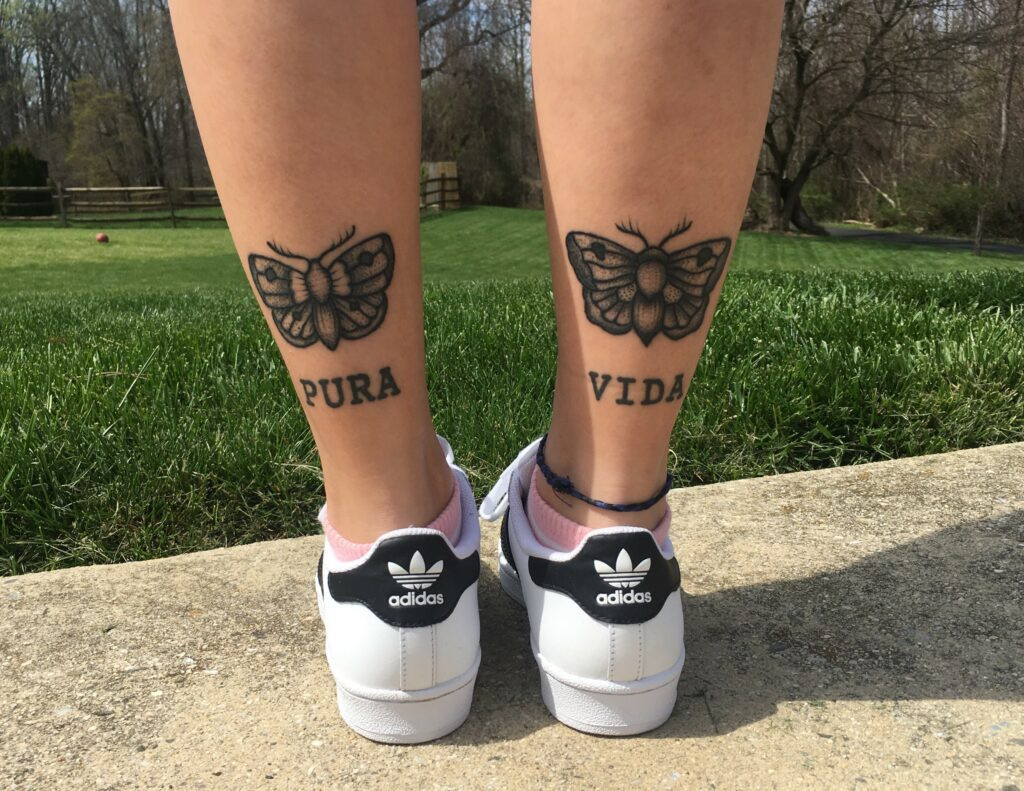Considering a tattoo but worried about eczema? At tattooat.com, we understand your concerns and are here to guide you through the facts about eczema and tattoos, ensuring your body art journey is safe and informed. Discover expert advice, precautions, and inspiring stories to help you decide if getting a tattoo with eczema is right for you, while also exploring design inspiration and the perfect artist for your tattoo vision with us.
1. When Should You Avoid Getting a Tattoo If You Have Eczema?
Yes, you should avoid getting a tattoo if you have eczema flare-ups, as flaring skin indicates an elevated immune response, potentially affecting the entire body, even if the tattoo location isn’t actively flaring. According to Lori Rowe, a tattoo artist in Portland, Oregon, any sign of skin issues is an immediate “no.” Dr. Peter Lio, a dermatologist at Northwestern University’s Feinberg School of Medicine, also advises against tattoos during flare-ups, as inflammation is considered abnormal for the skin as a whole.
It’s crucial to wait until your skin has calmed down, as tattoo ink can worsen flaring skin due to allergens and irritants, especially in colored inks. Dr. Ari Zelig, an allergist in Miami, Florida, suggests avoiding tattoos if any of the following apply:
- Taking isotretinoin (Accutane), which can impair healing time.
- History of keloid formation.
- History of skin lesions related to severe eczema, psoriasis, lichen planus, vitiligo, or discoid lupus.
- Bleeding disorder or receiving anticoagulation therapy.
- Not completed hepatitis B immunization.
- Previous topical allergic reaction or adverse reactions to ink.
Dr. Lio has treated patients for contact dermatitis and granulomatous reactions caused by tattoos, where the body creates chronic inflammation to wall off foreign material, often the pigment itself or contaminants from the procedure. Both reactions are extremely difficult to treat and sometimes require surgical removal of the tattoo.
2. Can You Still Get a Tattoo If You Have Eczema?
Despite the risks, many people with eczema still get tattoos for self-confidence, to beautify their bodies, or to create an artistic “mask” over eczematous areas. Others get tattoos for the same reasons as anyone else: to capture a story or memory or simply because they like the way they look.
Alexis Smith, who lives with moderate-to-severe eczema, has had nine tattoo sessions over seven years, stating, “I love having art on my body. In my experience, the good has always outweighed the negative.” Jayne Jezebelle, a tattoo artist in Baltimore, Maryland, has worked with clients with eczema, noting, “I think getting tattoos is a way for people to create a physical identity not determined by their environment or their genetics. A lot of my clients have said they felt more at home in their skin, more confident about themselves as they got more tattoos.”
 Woman with tattoos on her arms and legs
Woman with tattoos on her arms and legs
Skyler Winfield, who also lives with moderate-to-severe eczema, got her first tattoo at 18. “Growing up, my eczema was always severe. Kids and adults stared at me and asked what was wrong with me,” she said. “When I finally turned 18, I knew a tattoo was the first thing I wanted to get. It made me more confident knowing that people were staring at the beautiful and thoughtful artwork on my body, admiring it, instead of the eczema on my skin.” Zoe McReynolds echoed this sentiment, saying, “I have several tattoos in places where my eczema isn’t too bad. It’s made a real difference to my self-esteem. If I see a stranger looking closely at me, now I assume they’re checking out my tattoos, rather than staring at my eczema!”
3. What Should You Consider When Choosing a Tattoo Artist If You Have Eczema?
Choosing the right tattoo artist is crucial, especially if you have eczema; ideally, you’ll find someone with experience working with eczema or who personally has eczema. Sarah Walls, the office manager of Wonderland Tattoos in Portland, Oregon, who also lives with moderate eczema, advises potential clients to “take plenty of time and read all the artist’s reviews. If you look long enough, you’ll find an artist who knows about eczema and has worked with customers who have it.”
Schedule a consultation to discuss your eczema with the artist; Alexis Smith emphasized the importance of in-person conversations before getting started. “I explained to my tattoo artist, Jayne, that I have eczema, but that it doesn’t typically flare in the areas that I was getting tattooed,” Alexis said, adding that “most reputable shops will make you fill out a medical form and one of the questions is about skin conditions, so they’re very much aware of it.”
 Tattoo artist working on a client's arm
Tattoo artist working on a client's arm
Daniel Booey, who lives with moderate-to-severe eczema, mentioned the importance of researching a tattoo artist’s specific area of expertise, such as illustrations, lettering, black and white versus color, or working with scarred skin. All styles have potential implications for what tattoo might be right for someone with eczema. Research tattoo aftercare and how to watch for potential side effects or unusual skin reactions.
For people of color with eczema, U.K.-based tattoo artist Samuel Parul-Enahoro emphasized the importance of working with someone who understands the complexities of different skin tones. New York City-based tattoo artist Amanda Rodriguez advises people of color to send clear pictures of themselves so the artist can provide the right advice and show examples of their work on similar skin tones.
Here’s a quick checklist based on Sarah Walls’ advice:
| Step | Description |
|---|---|
| Ask for Referrals | Start with recommendations from friends or relatives. |
| Read Reviews | Check online reviews to gather insights about the artist’s experience and client satisfaction. |
| Review Portfolio | Look at the artist’s work on Instagram or their website to assess their style and quality. |
| Verify Licensing | Ensure the artist is licensed to practice in your area. |
| In-Person Consultations | Have at least two conversations to discuss your eczema and ensure the artist understands your specific needs and concerns. |
| Discuss Eczema Experience | If the artist lacks eczema experience, discuss your condition and ensure they understand the risks and benefits for you. |
| Hypoallergenic Supplies | Confirm the artist uses hypoallergenic inks, latex-free gloves, and allergy-friendly soap and moisturizers. |
| Comfort and Confidence Assessment | Ensure you feel comfortable and confident in your choice before committing to the tattoo. |
4. Why Should You Proceed with Caution and Test Your Skin Before Getting a Tattoo If You Have Eczema?
It’s essential to get a small patch test on your skin before getting a tattoo; “We do patch tests all the time,” said Sarah Walls. “It’s better to know how your skin will respond before we get started.” Dr. Zelig advises patients to “consider having a small dot tattooed with the desired ink and monitor for a reaction.”
A patch test, which only takes a few minutes, tests the needle and ink on your skin. “It’s a good precaution for someone with eczema,” said Sarah; waiting a full day or week is best for your comfort and confidence. If your skin reacts negatively, discuss your decision with your dermatologist or allergist, as the reaction indicates how your skin will react to a larger tattoo and whether it’s medically safe to proceed.
 Man with tattoos and a dog
Man with tattoos and a dog
5. What Are The Best Recommendations For The Day Of Your Tattoo Appointment When You Have Eczema?
The ideal time to get a tattoo is when you are completely flare-free; “Ideally the skin location for a tattoo should be eczema-free for at least a few months: in other words, the eczema should be under excellent control before getting a tattoo,” said Dr. Lio. Artists Lori Rowe and Jayne Jezebelle agreed, and Sarah Walls added key reminders for the night before the appointment:
- Go to bed early and get a good night’s sleep.
- Drink plenty of water to stay fully hydrated.
- Avoid alcohol.
- Don’t get sunburned.
- Don’t take Aspirin or Ibuprofen, as they can thin the blood.
- Eat a full breakfast to avoid coming on an empty stomach.
People with eczema are often better prepared for their own skincare; “I’ve seen people with eczema who take much, much better care of their skin than some of our customers. I know I do,” said Sarah. “In some ways, our customers with eczema already know so much more about how to care for their tattoos than people coming in who don’t know much about their own skin.” This includes bringing specific soap, lotion, or towels that work best for your skin; customizing the experience to meet individual needs is crucial. “Comfort is everything,” Sarah emphasized.
6. How Do You Ensure Proper Healing and Maintenance of a New Tattoo If You Have Eczema?
Members of the eczema community reported varied responses to new tattoos, with some experiencing no issues and others having immediate reactions; Alyssa Elizabeth, who lives with moderate-to-severe eczema, described her skin as getting “angry all around the tattoo and flared,” calling the healing process “the worst part of getting a tattoo.” Zoe McReynolds admitted that getting a tattoo on her back “was a disaster” because “the ink didn’t settle,” requiring touch-up work after healing.
Alexis Smith, however, experienced a different challenge: “For some reason my body is able to tolerate a million jabs of a needle, but the adhesive from the tape was enough to give me a new flare.” Her tattoo artist, Jayne, had alternative “wrap up options” that were more eczema-friendly than regular tape and Saran wrap. Planning ahead made the healing process smoother for Alexis’s follow-up tattoo work.
 Woman showing off her leg tattoo
Woman showing off her leg tattoo
Dr. Lio advises applying petroleum jelly and a bandage after the procedure, waiting a full day before removing it, while Jayne recommends “leaving it on for three days minimum, seven days ideally,” peeling it off “like a sticker by one of the edges” under warm running water. Both recommend a gentle, mild soap for cleaning and patting the area dry with a paper towel or air-drying.
Dr. Zelig gave additional maintenance advice:
- Wash your hands before touching your tattoo.
- Moisturize 1-2 times a day (or as needed).
- Do not pick or scratch at the tattoo; if itchy, pat it with your open palm.
- Do not remove peeling or scabbing skin.
- Avoid swimming for at least two weeks.
- Do not let pets lick or touch the tattoo.
- Avoid direct sunlight and sunscreen while healing.
7. How Can Tattoo Styles Impact Eczema-Prone Skin?
Different tattoo styles can have varying impacts on eczema-prone skin. Here’s a quick guide:
| Tattoo Style | Description | Potential Impact on Eczema |
|---|---|---|
| Minimalist | Simple designs, fine lines, less ink. | Lower risk of irritation due to less trauma to the skin. |
| Traditional | Bold lines, limited color palette. | Moderate risk; bold lines can cause more initial irritation. |
| Realism | Highly detailed, often large areas of color blending. | Higher risk due to extensive skin contact and potential for multiple ink types. |
| Watercolor | Soft, blended colors with no hard outlines. | Moderate to high risk; blending can require more passes over the skin. |
| Blackwork | Solid black ink, often geometric patterns. | Moderate to high risk; large areas of solid ink can be irritating, especially during healing. |
Consider the size, complexity, and color palette of your tattoo design to minimize potential irritation.
8. What Are Some Essential Aftercare Products for Tattoos on Eczema-Prone Skin?
Choosing the right aftercare products is crucial for healing tattoos on eczema-prone skin. Here’s a list of products to consider:
- Hypoallergenic Cleanser: A gentle, fragrance-free cleanser to keep the area clean.
- Moisturizer: A thick, emollient moisturizer to keep the skin hydrated.
- Petroleum Jelly: Creates a protective barrier to prevent infection and moisture loss.
- Non-Adhesive Bandages: To protect the tattoo without causing additional skin irritation.
- Soothing Balms: Look for balms with natural ingredients like calendula or chamomile to reduce inflammation.
9. How Does Skin Tone Affect Tattoo Ink Choices for Individuals with Eczema?
Skin tone can affect how tattoo ink appears and how the skin reacts. Individuals with darker skin tones should consult with artists experienced in working with melanin-rich skin to avoid issues like hyperpigmentation or keloid formation. Certain ink colors may also appear differently and require careful consideration.
10. What Are Some Common Misconceptions About Tattoos and Eczema?
There are several misconceptions about tattoos and eczema. One common myth is that anyone with eczema can’t get a tattoo, which isn’t necessarily true if the eczema is well-managed and the individual takes proper precautions. Another misconception is that black ink is always the safest option; while it may be less allergenic, it can still cause irritation. Always consult with a dermatologist and a tattoo artist experienced with eczema-prone skin to make informed decisions.
11. Navigating Tattoo Aftercare with Eczema: Dos and Don’ts
Effective tattoo aftercare is crucial, especially when dealing with eczema. Here’s a list of dos and don’ts:
| Category | Do | Don’t |
|---|---|---|
| Cleansing | Use gentle, fragrance-free soap; Pat dry with a clean paper towel. | Use harsh soaps; Scrub the tattoo; Use a cloth towel. |
| Moisturizing | Apply a thin layer of hypoallergenic moisturizer; Moisturize multiple times a day. | Over-moisturize; Use products with fragrance or dyes. |
| Protection | Protect the tattoo from sun exposure; Wear loose, breathable clothing. | Expose the tattoo to direct sunlight; Wear tight clothing. |
| General Care | Wash hands before touching the tattoo; Keep the area clean and dry; Monitor for signs of infection or flare-ups. | Pick or scratch the tattoo; Swim in pools or soak in tubs; Let pets lick the tattoo. |
12. How To Find a Tattoo Artist Experienced with Eczema-Prone Skin?
Finding a tattoo artist experienced with eczema-prone skin can make all the difference in your tattoo experience. Here are some tips:
- Ask for Referrals: Seek recommendations from friends or online eczema communities.
- Check Portfolios: Look for artists who have worked on clients with similar skin conditions.
- Consultations: Schedule consultations to discuss your specific needs and concerns.
- Read Reviews: Check online reviews for mentions of experience with sensitive skin.
- Ask Questions: Don’t hesitate to ask about their experience and techniques for working with eczema.
13. Understanding the Relationship Between Tattoo Inks and Eczema Flare-Ups
Tattoo inks can sometimes trigger eczema flare-ups due to allergens or irritants. Common culprits include certain pigments and additives. To minimize the risk, ask your artist to use hypoallergenic inks and do a patch test beforehand. Communicate any known allergies or sensitivities to your artist.
14. What is The Role of Patch Testing in Tattoo Safety for Eczema Sufferers?
Patch testing is crucial for tattoo safety, especially for those with eczema. It involves applying a small amount of the intended tattoo ink to a discreet area of skin to monitor for allergic reactions or irritation. This helps determine whether the ink is suitable for your skin and reduces the risk of widespread flare-ups.
15. What Precautions Should Be Taken During The Tattooing Process For People With Eczema?
Several precautions should be taken during the tattooing process for people with eczema:
- Ensure a Clean Environment: Make sure the tattoo studio is clean and sterile.
- Use Sterile Equipment: Verify that all equipment is properly sterilized.
- Choose Hypoallergenic Inks: Opt for hypoallergenic inks to minimize the risk of allergic reactions.
- Communicate with the Artist: Clearly communicate your eczema and any known allergies.
- Take Breaks: Take breaks during the session to allow your skin to rest.
16. Managing Itchiness After Getting a Tattoo When You Have Eczema
Itchiness is a common side effect of tattoo healing, but it can be more intense for those with eczema. Here are some tips to manage it:
- Moisturize Regularly: Keep the area well-moisturized to prevent dryness.
- Apply Cold Compresses: Use cold compresses to soothe the itch.
- Avoid Scratching: Resist the urge to scratch, as it can damage the tattoo and increase the risk of infection.
- Use Anti-Itch Creams: Apply over-the-counter anti-itch creams containing hydrocortisone.
17. Long-Term Tattoo Care Strategies for Individuals with Eczema
Long-term tattoo care is essential for maintaining the vibrancy and health of your tattoo. Here are some strategies for individuals with eczema:
- Regular Moisturizing: Continue moisturizing the area daily.
- Sun Protection: Always protect the tattoo from sun exposure with sunscreen or clothing.
- Avoid Irritants: Avoid products with harsh chemicals, fragrances, or dyes.
- Stay Hydrated: Drink plenty of water to keep your skin hydrated.
- Monitor for Changes: Regularly check the tattoo for any signs of changes or irritation.
18. How Can Dietary Choices Impact Tattoo Healing and Eczema Symptoms?
Dietary choices can play a significant role in tattoo healing and managing eczema symptoms. A balanced diet rich in vitamins, minerals, and antioxidants can support skin health and reduce inflammation. Consider incorporating foods like fatty fish, fruits, vegetables, and whole grains into your diet. Avoid processed foods, sugary drinks, and common allergens that may trigger eczema flare-ups.
19. What Are The Potential Risks of Tattoo Removal for People with Eczema?
Tattoo removal methods, such as laser removal, can pose risks for people with eczema. Laser treatments can cause inflammation and irritation, potentially triggering flare-ups. Discuss the risks and benefits with a dermatologist before considering tattoo removal. Alternative options like cover-up tattoos may be safer for those with eczema.
20. What Are The Latest Research Findings on Tattoos and Eczema?
According to research from Portland State University’s Art Department, in July 2025, studies are ongoing to better understand the relationship between tattoos and eczema. Preliminary findings suggest that proper pre- and aftercare, along with careful ink selection, can minimize the risk of complications. Researchers are also exploring new tattoo techniques and ink formulations that may be more suitable for sensitive skin.
FAQ: Getting Tattoos with Eczema
Can I get a tattoo if I have eczema?
Yes, but it’s essential to ensure your eczema is well-managed and you take proper precautions.
What should I do before getting a tattoo if I have eczema?
Consult with a dermatologist and a tattoo artist experienced with eczema-prone skin. Get a patch test to check for allergic reactions to the ink.
What type of ink is best for eczema-prone skin?
Hypoallergenic inks with minimal additives are generally the best choice.
How do I care for a new tattoo if I have eczema?
Use gentle, fragrance-free cleansers and moisturizers. Avoid scratching and protect the tattoo from sun exposure.
Can tattoo removal trigger eczema flare-ups?
Yes, tattoo removal methods like laser removal can cause inflammation and potentially trigger flare-ups.
What are the signs of an infected tattoo if I have eczema?
Increased redness, swelling, pain, and pus are signs of infection. Consult a healthcare professional immediately.
How long should I wait after an eczema flare-up to get a tattoo?
Wait until your skin has completely healed and your eczema is well-managed for at least a few months.
What are some alternative tattoo options for people with eczema?
Consider temporary tattoos or henna designs as alternatives to permanent tattoos.
How can I find a tattoo artist experienced with eczema-prone skin?
Ask for referrals, check portfolios, and schedule consultations to discuss your specific needs.
Can dietary changes help with tattoo healing and eczema?
A balanced diet rich in vitamins, minerals, and antioxidants can support skin health and reduce inflammation.
Conclusion
Ultimately, deciding whether to get a tattoo with eczema requires careful consideration and consultation with healthcare professionals and experienced tattoo artists; remember, you know your body best. For design inspiration, expert artist connections, and detailed guides on tattoo aftercare, visit tattooat.com today and start your informed and artistic journey!
Address: 1825 SW Broadway, Portland, OR 97201, United States
Phone: +1 (503) 725-3000
Website: tattooat.com